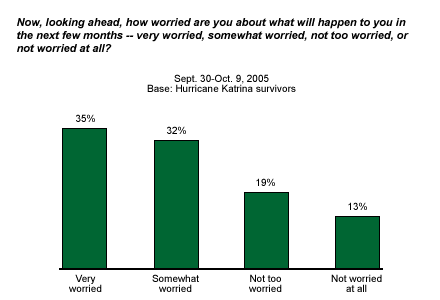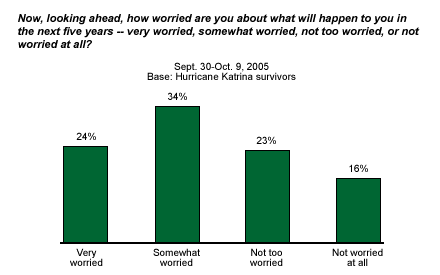In the aftermath of Hurricane Katrina, victims struggled just to get through each day. Only after basic needs like food, clothing, and shelter were met could victims even begin to consider the future. Now that they are able to look ahead, a significant number fear what that future holds. Results from a CNN/USA Today/Gallup poll of Katrina victims*, conducted six weeks after the hurricane hit, illustrate just how worried they are about what will happen to them in the months and years ahead.
The poll interviewed a random sample of 1,510 adults who applied for hurricane disaster relief from the American Red Cross. When respondents were asked how much they worry about what will happen to them in the next few months, more than a third say they are "very" worried.

Black hurricane survivors are significantly more likely than white survivors to worry about their immediate futures. Specifically, 42% of black survivors say they are very worried, while 24% of white respondents report being this worried.
As one might expect, those who experienced the most severe damage from Katrina are more worried about the future than those who experienced less damage. Among those who say their homes were destroyed, 67% are very worried what will happen to them in the next few months. And 49% of those who had their homes damaged to the point where they can't live in them also say they are very worried. That compares with just 22% of those whose homes were not damaged or only suffered minor damage but are still livable.
Geographically speaking, half (53%) of survivors who previously resided in the city of New Orleans are very worried. This is significantly higher than the percentage among survivors who reside in the suburbs surrounding New Orleans, in different parts of Louisiana, or in Alabama or Mississippi.
Victims Less Worried About Long-Term
The survey also asked survivors to share their concerns about what will happen to them in the next five years. Fewer people express worry about the long-term than about the short-term, but one in four still report being very worried (24%) about what will happen to them within the next five years.

Again, respondents' level of worry about the long-term future varies by race and extent of personal loss. While 15% of white respondents say they are very worried what's going to happen in the next five years, the percentage is twice as high among black survivors (30%). One-third of those whose homes were destroyed (36%) say they are very worried. That percentage falls to 25% among those whose homes were damaged to the point that they can't live in them, and 20% among those whose houses were not damaged or suffered only minimal damage.
*Results are based on telephone interviews with a sample of 1,510 adults, aged 18 and older, drawn randomly from the American Red Cross database of applicants seeking assistance due to the effects of Hurricane Katrina. Interviews were conducted Sept. 30-Oct. 9, 2005.
The vast majority of applicants provided a working contact telephone number to the Red Cross. Gallup did reverse phone lookups to obtain telephone numbers for the portion of the selected sample that did not provide a contact number. Where necessary, Gallup interviewers tracked down updated telephone numbers when respondents had moved from their previous location. Interviews were conducted on both landline and cellular telephones. Full details on the poll methodology can be found at https://www.galluppoll.com/
In addition to sampling error, question wording and practical difficulties in conducting surveys can introduce error or bias into the findings of public opinion polls.
